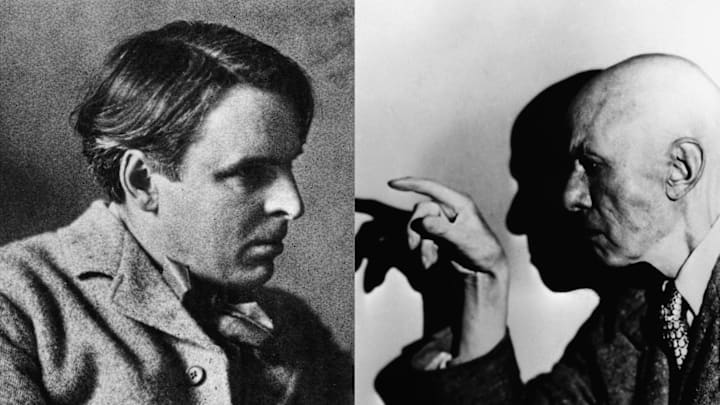It ended, as magic duels often do, with someone being kicked down a flight of stairs.
In 1900, the rivalry between poets and self-proclaimed magicians William Butler Yeats and Aleister Crowley had reached a fever pitch. Crowley was a notoriously malevolent practitioner of ceremonial magic and occultism who unnerved Victorian England with his amoral beliefs and behaviors, including drugs and promiscuity. In his early twenties, he joined the Hermetic Order of the Golden Dawn, a secret society that embraced the study of magic. Among its members were Dracula author Bram Stoker and Yeats, who was one of the 20th century’s most renowned poets.
It soon became apparent that Yeats and other members of the London chapter were uncomfortable with Crowley’s interpretation of their practices and rituals: They decided Crowley would no longer be welcome. This made the occultist quite angry. Anticipating a possible face-off with Yeats, Crowley consulted with MacGregor Mathers, a magician and founder of the Golden Dawn who advised Crowley on “spells” that could convert Golden Dawn members into siding with Crowley. Mathers also recommended Crowley dress in Celtic garb.
Both Crowley and Yeats were gripped in the belief their occult skills could have a real-world effect: Crowley wanted to take some of the organization's top-secret papers and was prepared to use his magical abilities to do it, though he was also reportedly armed with daggers.
When Crowley showed up to the London headquarters of the Golden Dawn on Blythe Road, a physical confrontation ensued. According to Yeats biographer Richard Ellman, a determined Crowley attempted to ascend a flight of stairs while Yeats and other members of the Golden Dawn confronted him, each shouting spells at the other. Despite their claimed mastery of their craft, the “battle” ended when, according to Ellman, Yeats resorted to simple assault and cast his foot on Crowley’s person:
“…When Crowley came within range the forces of good struck out with their feet and kicked him downstairs.”
For his part, Yeats described the duel with Crowley ending with Crowley being escorted out of the building and then phoning police so he wouldn't return. The ending was rather anticlimactic, but the confrontation nonetheless earned the dramatic name of “The Battle of Blythe Road.”
Yeats was a member of the Golden Dawn for a total of 32 years, passing away in 1939; Crowley eventually founded Thelema, a religion that preached a hedonistic lifestyle—a belief system that led English newspapers to crown Crowley “the wickedest man in the world.” He died in 1947 at age 72. Despite the best efforts of both men, each appeared to die of perfectly normal causes.
[h/t Open Culture]
